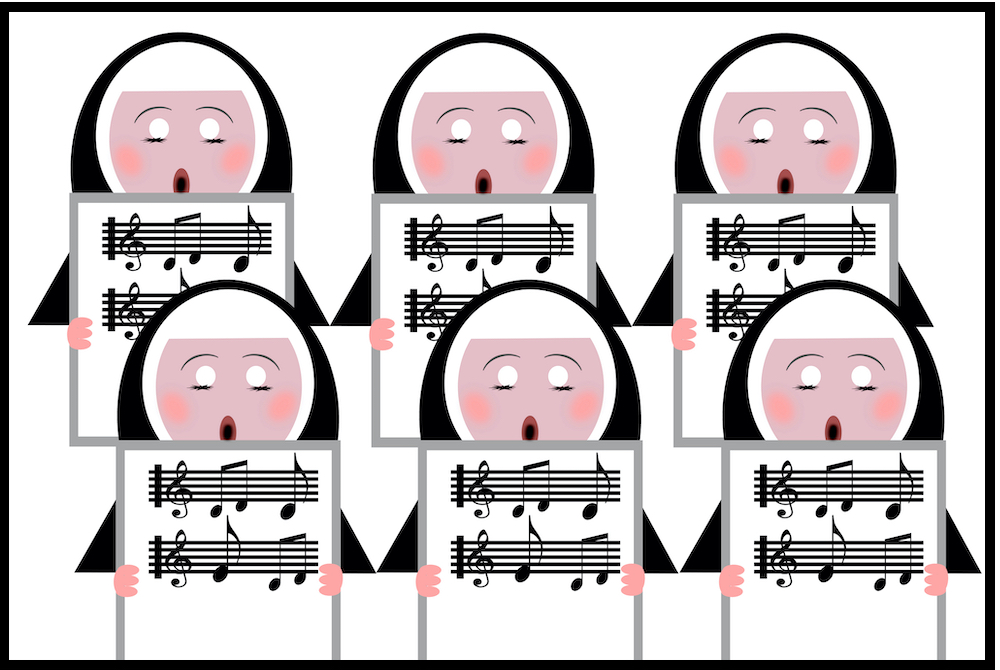
(Dreamstime/Djembe)
The other day, I found myself relaxing in front of the television, watching the film "Sister Act." It was the conclusion of a packed week of meeting and ministering in the virtual world (and through more Zoom meetings than I want to count), full days of living out my vocation as a Franciscan Sister of Perpetual Adoration in our modern world.
"Sister Act," which came out in 1992, has been part of the soundtrack to my life since I first watched the film, when I was around 11 or 12 years old. I was tucked away with my family in the living room of our cozy farmhouse in Iowa, firing questions at my Dad as the story unfolded, enthralled.
In those days, my favorite scene was when the sisters left their monastery and joyfully beautified their San Francisco neighborhood. While C+C Music Factory's "Just a Touch of Love" played in the background, I watched the sisters paint murals, build a playground, open a preschool, clean up garbage, make friends, sing their hearts out, and learn dance moves from their neighbors. I was inspired, attracted. And curious. Could God want me to be a nun? (It would be several years until I'd understand that a being a sister would suit me better than nunhood, and that there's a difference.)
As I grew up, the picture of religious life that I saw in the film — sisters sharing prayerful, meaningful, communal and joyful lives — energized my imagination. I wanted to live a life like that, somehow. It wasn't long after I graduated from college that I'd decide that I wanted to join the Franciscan Sisters of Perpetual Adoration. I entered at age 24 and have been part of the community for nearly 15 years now.
Watching "Sister Act" again, all these years later, was almost like seeing it for the first time. I know that when I watched the movie in my youth, I didn't notice the adult themes of sex and crime in the plot lines. But there was more that seemed new to me.
This time, I noticed how deeply the sisters care for each other — the loyalty and affection are deep. The communal bonds are transformative.
I found myself brought to tears by the character development of the youngest sister in the group, Sister Mary Robert (Wendy Makkena). She first appears on the screen as a new sister, shy and slightly awkward. As a choir member, she moves her lips, but only a whisper cracks through. But as the narrative unfolds, Sister Mary Robert learns how to sing from her gut and her heart. She belts out a solo, loud and proud. And as she sings, she becomes bolder, more herself.
I realized, watching her sing, that her story reflected my own experience. When I first came to my community, I was eager and idealistic but far from grounded, centered or calm. I was impatient in those days, a tangled combination of openness and resistance wrestling within me. I was accident prone. I made foolish choices. I was still far from who God wanted me to be, but I was in the right environment to help me grow.
Advertisement
I can see now how I have had my own Sister Mary Robert experience. After 15 years, my voice has become strong and clear. I have discovered how to share my perspectives and passions for the common good with joy and enthusiasm. I have gained a groundedness, too, as I have grown to feel more at home in religious life, in myself. Like the women whose legacy I am inheriting, I hope that I am a mouthpiece for God and the Good News, proclaiming peace, justice and liberation. I have grown to be steady in my efforts to keep Christ as my center, to keep my gaze fixed on Jesus.
In "Sister Act," it's Sister Mary Clarence* (Whoopi Goldberg) who helps Sister Mary Robert find her voice. Although no one gave me voice lessons, the gift of relationship with my community helped me to grow. As written by Rosemary Haughton
… the modern concept of "maturity," developed overwhelmingly by male psychologists, is based on male-derived values of independence, separation, and control. There are other ways of recognizing maturity, when it is judged rather by values of interdependence, inclusiveness, and relationship.
I can attest that the maturity I have gained in religious life has much to do with discovering how I fit, am loved and belong: an outcome of relational, communal living. We know one another by our love.
I was able to become more myself and develop my voice through the gift of love. As a new sister, I had a big imagination, but it wasn't expansive. I figured that I'd teach or feed people who were hungry. I quietly hid a childhood dream of being a writer, assuming that I had no talent or ability. But then, as my relationships with my sisters grew and deepened, I gradually became comfortable sharing the little poems I wrote in my journal and the essays I would pound into the keyboard. To my surprise, I heard the suggestion and encouragement to take myself and my gifts seriously. I am now doing things that I never would have imagined for myself: writing, preaching, podcasting, organizing and leading.
I still sometimes struggle with impatience, but I also find joy in the slow, steady movement of God, in waiting and watching as things gradually transform in a person's inner life when I companion them as a retreat facilitator or spiritual director. I am more centered, able to experience contentment and satisfaction in simple, joyful — and difficult — moments of community life. Who I am today is the making of communal, relational loving.
I realize that in "Sister Act," Sister Mary Robert didn't actually "find" her voice. She had it all along. Just like the sisters with whom I share my life have helped me to become more fully myself, Sister Mary Robert's sisters helped her to realize that she could glorify God best by singing out loud. And when she did, she became more confident, more fully alive. St. Irenaeus is attributed as saying "the glory of God is a human being fully alive" Sisterhood is sacred because communal living enables women to be more fully themselves, more fully alive. Through all of our maturation, God is glorified.
* The character Deloris' undercover sister name has been corrected.
[Sr. Julia Walsh, Franciscan Sister of Perpetual Adoration, is a retreat director, speaker, educator, activist and award-winning writer who blogs at MessyJesusBusiness.com. Follow her on Twitter: @juliafspa.]





